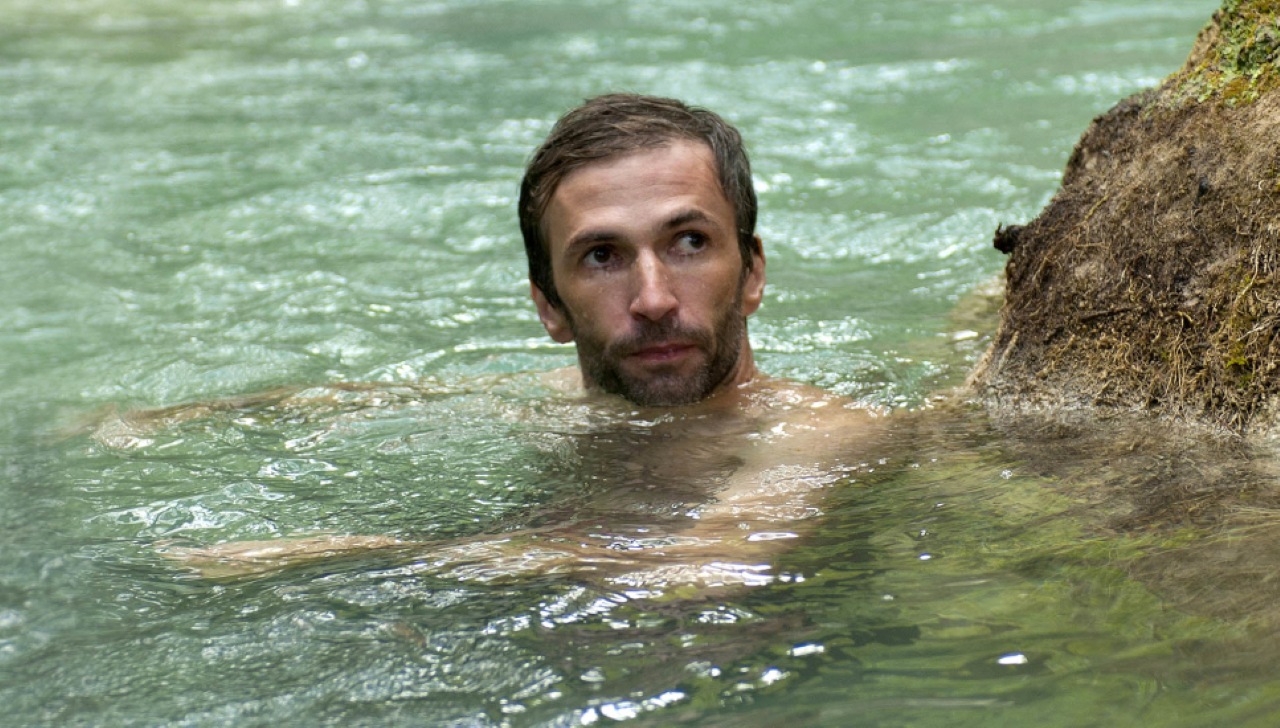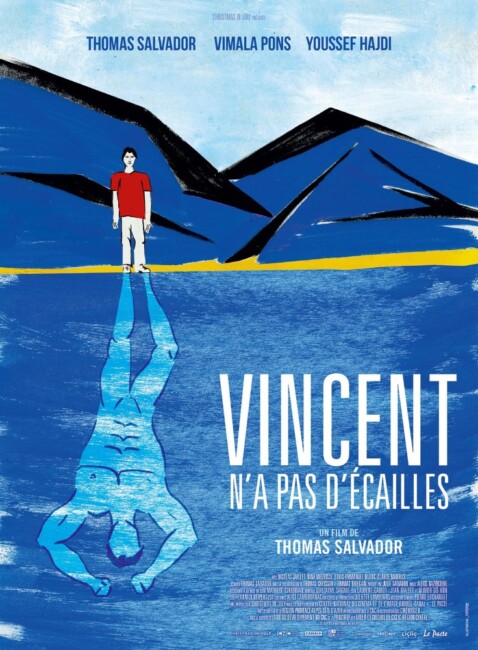(Vincent N’a Pas d’Ecailles)
Crew
Director/Screenplay – Thomas Salvador, Screenplay Collaboration – Thomas Bidegain & Thomas Cheysson, Producer – Julie Salvador, Photography – Alexis Kavyrchine, Visual Effects Supervisor – Frederic Moreau, Production Design – Samantha Mugnier. Production Company – Christmas in July/Centre National du Cinematographie/Canal +/Le Pacte/Cineimage 8.
Cast
Thomas Salvador (Vincent), Vimala Pons (Lucie), Youssef Hajdi (Driss), Nina Meurisse (Lucie’s Friend), Nicolas Jaillet (Lieutenant Le Brec)
Plot
Vincent drifts through rural France and finds a labouring job in a small town. He is attracted to a local girl Lucie and they become involved. Vincent spends all his spare time swimming in the local rivers and lakes. He sneaks into a pool with Lucie and demonstrates an unusual ability whereby he conducts a massive leap up from out of the water to the side of the pool. He explains that he has great physical strength and endurance whenever he is in water, although this quickly fades once he is out of it. Vincent’s secret is exposed when he douses himself in water to save his friend/co-worker from being beaten up by other men during which he throws one of the combatants against a wall and wounds them. He is then pursued by the gendarmerie and flees, using his abilities to evade pursuit as this escalates into a massive manhunt.
Vincent is the directorial debut of Thomas Salvador who also writes the script, devises the water effects and plays the title role. Salvador had previously made four short films up to this point. The film gained a modest word of mouth reputation at various international film festivals. Salvador has directed/written/starred in one other film to date with The Mountain (2022), which also contains some fantastic elements.
Vincent could almost be described as a superhero film without any costumes (the trailer went out boasting that it was a superhero film that was “100% without any CGI effects” – something that the end credits reveal to not entirely be true). Vincent is a hero who has powers – in a comic-book universe, his story could easily be that of another merman superhero like Aquaman, Sub-Mariner or tv’s Man from Atlantis (1977-8) – the literal translation of the original French title is ‘Vincent Has No Scales’. The only thing that seems missing is the world-shattering exploits and battles against villains; this is much more low key and everyday work in the vein of a film like Unbreakable (2000). A more genre-identifying superhero film would probably also have come up with some explanation for Vincent’s powers.
The build-up of the film is appealingly quirky as we observe Thomas Salvador going about his daily life – having to look for somewhere to live, find work and especially his meeting with and developing a relationship with Vimala Pons. These romantic scenes take up the bulk of the early section of the film and are playful and charming – the sort of thing that French cinema does well.

Interspersed with these, Vincent seems to spend a lot of time in water or swimming. You start to think that some of his butterfly strokes are incredibly powerful or that he makes amazing dolphin-like leaps out of the water but these are not too far removed from the bounds of normality. That is up until the scene where he is struggling to demolish a wall with a hammer, goes away and takes a shower with his clothes on and then comes back and simply pushes the whole wall down. Then comes the revelation to Vimala Pons of what he can do, amazing her by leaping right out of a swimming pool into a standing position. All of this has a quirky, charming intrigue. Not to mention that the locations are stunningly photographed.
The second half of the film has Vincent a fugitive on the run from the local gendarmerie. This plays with the same playfully serio-comic quirkiness as the romantic lead-up does and there is an amusing fun to seeing Vincent run rings around les flics – jumping up onto bridges, across the roofs of cars, snapping the handcuffs placed on him and the like.
The only complaint I would make with these scenes is a nitpicker one, nevertheless one that started to get in the way of the film’s credibility for me. And that is that Vincent manages to be the subject of a massive police manhunt without actually being guilty of or charged with anything. All he does is get into a fight and throw a guy against a wall to save his friend who is being beaten up by three other men – now, if the guy he threw against the wall were dead, it’d be another story but he is seen moving as the scene ends and we are never told otherwise. Vincent could be charged with assault but any defence attorney could either plead it out or argue it was provocation in that Vincent was merely going to help his friend who was being beaten up. It is quite possible that law enforcement may work differently in France but in any other part of the Western world, the police would take witness statements, interview Vincent and his friend to hear their side and then determine if there was enough substance to make a charge. In all likelihood, unless the victim had serious injuries, they would not proceed much further. At the outside, Vincent would have been given a warning by the judge, even a fine or some light community service. Instead, what we get is a massive manhunt with multiple vehicles, alerts around the area listing Vincent as a wanted fugitive, armed officers and what look like the entire gendarmerie of one small town on the hunt for him. Now maybe you could argue that they were bored as a small-town police force but in any other metropolitan centre this would be regarded as a massively over-the-top outlay of resources and manpower just to bring in a single suspect for questioning.


